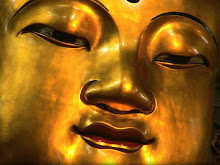Can Sex Lead to Enlightenment?
Tantric and Buddhist Perspectives
Oct 16, 2009 Anita Saran
Tantra, which originated in post-vedic India, may be defined as a form of yoga that teaches the attainment of spiritual ecstasy via esoteric and erotic techniques. One of its goals is to further spiritual evolution through sexual energy.
The practice of tantric sex has been growing in the West. This is often referred to as pop tantra because it is bereft of the other more important aspects of the practice. Many are attempting to attain enlightenment through this ancient practice. But the majority are interested in either enhancing sexual pleasure or creating "spiritual bonds" with their lovers.
Maria P, a writer doing research for her tantric novel, attended a workshop in New York on tantra. She says: "It was interesting that just before the break, one couple piped up to the teacher, 'Is this all we're going to cover? When are we getting to the sex?'
"When the teacher explained that this was more the spiritual aspect, they said, 'Oh, well, no thanks,' and got up and left. Later, when I approached the teacher, she told me she gets a few in every crowd like that. Even though the write up advertising her class tells what will be covered, they always run a 'hot' image with it, so some get the wrong idea."
The Mother of Tantra – Margot Anand
Margot Anand, a disciple of the late Bhagwan Rajneesh (known as Osho), is considered "the mother of tantra." In an interview with What is Enlightenment? magazine, she says that in tantra there is a belief that The Buddha could not have attained enlightenment if he hadn't experienced the transcending bliss of sexual union with his wife. Tantrics claim that The Buddha did not attain enlightenment under the bodhi tree, but in sexual union with his wife.
However, she admires those who become celibate because of a natural tendency, and not because they are repressing their desire. She believes that only after experiencing and indulging in sexual activity is a practitioner ready for celibacy, and mentions how Osho always spoke of Mahatma Gandhi in this regard. Until the very end, says Anand, Gandhi was obsessed with sex and struggled to free himself from it.
Yet it is clear to Anand that celibacy frees people from attachment and jealousy. She says about sex: "If you, once and for all, don't bother with it and remove yourself from it, you probably have a much better chance to focus your energies on spiritual matters."
The Bliss of Celibacy and Sense-Restraint
In 1996, Sister Siripannà, from the Amaravati monastic community in England, conducted a weekend workshop at the Barre Center for Buddhist Studies titled Renunciation: The Highest Happiness.
In a lecture, she explained, “There is a part of us that feels renunciation means to lose everything we love; having to deprive ourselves of what is pleasant and enjoyable in life. . . Renunciation can sound like passivity, a “door-mat” philosophy, but actually it is the opposite.”
She says the practice of sense restraint has given her a "tremendous sense of freedom and relief" and no longer is she "running after the world."
The Buddha on Sensual Pleasures
Sister Siripannà quotes The Buddha on the subject of sensual pleasures, saying, “Whatever bliss in the world is found in sensual pleasures, / and whatever there is of heavenly bliss – / These are not worth one sixteenth part / Of the bliss that comes with craving’s end.”
A Buddhist Monk on Sexual Activity and Enlightenment
Bhante Henepola Gunaratana, a Buddhist monk from Sri Lanka, in a fascinating interview with Simeon Alev for What Is Enlightenment? magazine, says, "And therefore in his gradual teaching, he [The Buddha] said that first there is the pleasure in sexual activities, and then there are the disadvantages, then there are the problems. And only when you see the problems, only then do you begin to realize that these disadvantages, this negativity, are inherent in sexuality – they are intrinsic."
According to Bhante, sexual activity cannot lead to enlightenment. He mentions The Buddha as saying in the Pali Canon that no matter how well one knows the sutras, or how long he lives alone in a desolate cave, if he cannot get rid of his lust, hatred and ignorance, he cannot attain enlightenment.
Bhante adds that sexual indulgence leads to jealousy and confusion. Although he does not condemn "moderate, wise, healthy sexual activity," he says that it is forbidden to those whose aim is enlightenment.
Celibacy Requires Self-Mastery
Spiritual aspirants contend that celibacy requires ability and an attitude of self-mastery which are signs of inner freedom, of responsibility towards oneself and others. They point out that spiritual practitioners have long known the benefits celibacy brings: those of improved concentration and purity.
They explain that just as the body needs food for sustenance, the soul needs purity.
If you enjoyed this article, you may like to read about how meat-eating affects the psyche, and the moral dangers of eating meat – both according to the Buddhist perspective.
Sources:
- What is Enlightenment? magazine - Margot Anand's interview with Susan Bridle
- Sex, Celibacy and the Spiritual Life interview with Bhante Henepola Gunaratana
Copyright Anita Saran. Contact the author to obtain permission for republication.
Comments
1 Comment:
About Me

- KTBMovie
- "Lost Secret of Immortality" For thousands of years, science and religion have searched for the key to enlightenment. Killing the Buddha uncovers the sacred knowledge of the Philosopher’s Stone and guides viewers to the mysterious Kundalini – the original enlightened energy of the body. Filmed in China and Tibet, this revolutionary film reveals the secret of practicing sexual yoga to achieve tantric enlightenment. Visit www.killingthebuddhamovie.com for more information about the motion comic and movie.
Tuesday, October 26, 2010
Can Sex Lead to Enlightenment?: Tantric and Buddhist Perspectives
via suite101.com
Subscribe to:
Post Comments (Atom)
No comments:
Post a Comment